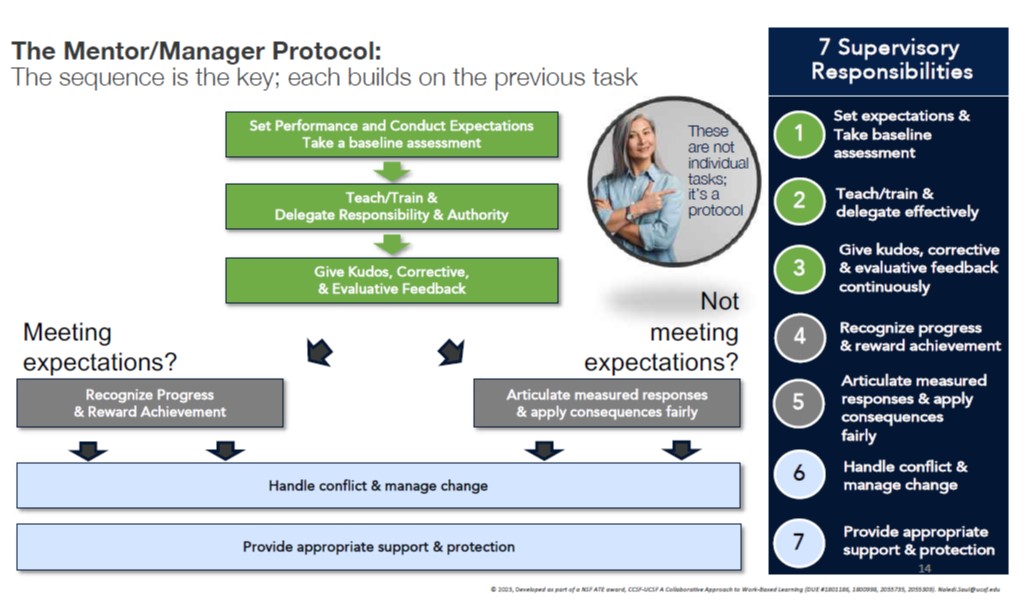 I recently attended a fantastic webinar, organized by RISE-UPP (Re-Imagining STEM Equity Utilizing Postdoctoral Pathways) and featuring Naledi Saul, Director of the UCSF Office of Career and Professional Development. I highly recommend watching this webinar, it is one of the best I have seen. You can jump straight to the recording of the webinar here, but I’ll give you the key messages as well.
I recently attended a fantastic webinar, organized by RISE-UPP (Re-Imagining STEM Equity Utilizing Postdoctoral Pathways) and featuring Naledi Saul, Director of the UCSF Office of Career and Professional Development. I highly recommend watching this webinar, it is one of the best I have seen. You can jump straight to the recording of the webinar here, but I’ll give you the key messages as well.
Nalidi Saul, the director of the UCSF Office of Career and Professional Development, discussed the importance of teaching research mentors inclusive people management skills. She pointed out that research faculty have three roles, as an advisor who supports career development, as an educator who teaches concepts and skills, and as a supervisor who oversees human resources. She defines people who fulfill all three functions as mentors, and she emphasizes that although well prepared for their roles as advisors and educators, most research mentors receive little to no training to prepare them for their HR/ supervisor role.
In the webinar, as well as in a recent publication (Clement et al., 2020), she lays out the various supervisory responsibilities of a mentor, highlighting the lack of structure and training in standard research laboratory practices. One of her key messages is that by formalizing and clarifying these supervisory responsibilities, the laboratory structure can become more equitable.
In the webinar, she provides a seven-point framework of supervisor responsibilities and describes how they should be followed as a sequence (see figure). The first three are indispensable and need to be part of the formal interactions between mentor and mentee:
- Set performance, conduct expectations, and take baseline assessment.
- Following the baseline assessment, develop a plan to fill the gap so the trainee can reach the performance or conduct expectations. Teach, train and delegate responsibility and authority.
- Give regular feedback: Kudos (job well done), as well as corrective (please do it this way, not that way) and evaluative feedback (you are making good or slow progress towards your goal).
 By following these three steps, the supervisor provides clear and objective performance expectations to the trainee. If the trainee meets the defined expectations, the supervisor’s responsibility is to recognize and reward the progress (step 4). If the trainee does not meet the defined expectations, the supervisor’s responsibility is to articulate a measured response, and if there is a consequence to apply it fairly (step 5).
By following these three steps, the supervisor provides clear and objective performance expectations to the trainee. If the trainee meets the defined expectations, the supervisor’s responsibility is to recognize and reward the progress (step 4). If the trainee does not meet the defined expectations, the supervisor’s responsibility is to articulate a measured response, and if there is a consequence to apply it fairly (step 5).
By following the above steps as a standard protocol for all mentees, the mentors are less likely to jump to the conclusion that problems arise due to a deficit in the individual. Rather, the mentor is expected to reflect on their own contribution to the problem. Did they set expectations appropriately? Did they provide training and feedback?
If the mentor can be confident that they followed the protocol appropriately, it’s time to handle conflict and manage change (step 6), which she describes as being often the most difficult aspects of the supervisory role, but also the ones that benefit most from structure and planning. Consequences should be progressive (not punitive) and productive (related to work). Finally, she highlighted the importance of a supervisor being familiar with their systems of support to help them manage challenges and protection available to the mentees (step 7). These include the Dean’s office, student health services, the Restorative Justice Office, the Ombuds, etc. (see figure).
The inclusion of the supervisory duties as part of the mentor’s role can go a long way towards resolving conflicts more equitably and fairly. This webinar and the linked paper can be a good starting point, but a particularly exciting take away from this webinar is learning that the Inclusive Research Mentor / People Manager Training program will open to participants outside of UCSF this autumn. For more information on this opportunity see https://career.ucsf.edu/mentor-manage.
Reference
Clement L, Leung KN, Lewis JB, Saul NM.2020.The Supervisory Role of Life Science Research Faculty: The Missing Link to Diversifying the Academic Workforce?. J Microbiol Biol Educ.21:10.1128/jmbe.v21i1.1911. https://doi.org/10.1128/jmbe.v21i1.1911

0 Comments